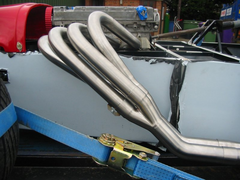amalyos
|
| posted on 4/5/06 at 10:02 AM |

|
|
Exhaust sealing
Can you use Silicone to seal exhausts? Is there any special type to use?
I'd rather not use Gungum!!!
|
|
|
|
|
smart51
|
| posted on 4/5/06 at 10:25 AM |

|
|
I used silicone to seal the ends of my repackable silencer - it doesn't get too hot. One end stiuck really well, the other peeled off after a
few weeks.
I used an exhaust sealing cement to join the link pipe to the doen pipe. It worked really well. line the inside of the larger pipe before you push
in the smaller pipe and you shouldn't see it.
|
|
|
MikeR
|
| posted on 4/5/06 at 11:15 AM |

|
|
this was covered recently, the best idea seemed to be builders heat sealing something or other. Basically the stuff they use when fitting boilers.
Never dries out, bit clay like, designed for the job.
|
|
|
David Jenkins
|
| posted on 4/5/06 at 12:16 PM |

|
|
There is a specific paste for that job - white stuff that goes hard when it gets hot. It's also supposed to act as an assembly lubricant when
runny. It's not GunGum though - it's pukka stuff.
I didn't bother myself - I used copper grease! All my joints are a good fit, the grease will burn off, leaving a copper residue that will help
me when I next need to take things apart (e.g. for repacking the silencer). It's bl**dy hard to separate the proper stuff after it's
hardened.
David
|
|
|
MkIndy7
|
| posted on 4/5/06 at 01:52 PM |

|
|
Theres 2 kinds of High temperaturte plumbers silicone used.
1 is for sealing between sections of boilers and that never really sets
And (PlumbaFlue trade name me thinks) thats high temperature silicone, upto about 400 DegC that is used to seal imbetween sections of Flue that sets
like normal silicone
|
|
|
NS Dev
|
| posted on 4/5/06 at 02:00 PM |

|
|
quote:
Originally posted by David Jenkins
There is a specific paste for that job - white stuff that goes hard when it gets hot. It's also supposed to act as an assembly lubricant when
runny. It's not GunGum though - it's pukka stuff.
I didn't bother myself - I used copper grease! All my joints are a good fit, the grease will burn off, leaving a copper residue that will help
me when I next need to take things apart (e.g. for repacking the silencer). It's bl**dy hard to separate the proper stuff after it's
hardened.
David
Yep, completely agree, I use the same, well actually nickel anti seize which is very similar to coppaslip. Helps as an assembly lubricant, and the
joints should not leak anyway, shouldn't really need sealant if they are the right size.
Multipiece manifolds don't use sealant!
don't think Ned will mind me posting a pic of his manifold, no sealant here, and they are slip fits held in place by bolts, no clamps
either........
 
side shot
Retro RWD is the way forward...........automotive fabrication, car restoration, sheetmetal work, engine conversion
retro car restoration and tuning
|
|
|
britishtrident
|
| posted on 4/5/06 at 02:14 PM |

|
|
Holts Firegum aka exhaust assembly paste.
|
|
|
David Jenkins
|
| posted on 4/5/06 at 02:20 PM |

|
|
That's the stuff!
Wouldn't use it again though - it's a damn fine cement when it sets.
David
|
|
|
jimgiblett
|
| posted on 4/5/06 at 02:25 PM |

|
|
I find most exhaust pastes just crack and leak on bike engined cars (probably due to the vibration. I was recommended the Bosal putty as an
alternative. But as I couldn't get hold of any I used the othe slternative clear silicone sealant (yes it must be clear so as to not contain
any chalk which is usually the pigment carrier). I have regularly used silcone and it has worked very well. One tip is to make sure the silicone has
properly cured before starting the engine and running hot gasses through the pipe.
Multipart exhausts seal via the expansion of the inner tube within the sleave so should not require further sealing. Repackable silencers however
tend not to get a deformed seal concentrated around the rivets and a bead of silicone is just the job to form a seal.
- Jim
|
|
|
paulf
|
| posted on 4/5/06 at 03:29 PM |

|
|
I have used the non setting type of sealant on my silencer, it was marked as suitable for sealing around fire doors etc and swells with heat. I found
it alsts better than the setting type and is easier to seperate when required, it also has no acetic acid in it.
Paul.
quote:
Originally posted by MkIndy7
Theres 2 kinds of High temperaturte plumbers silicone used.
1 is for sealing between sections of boilers and that never really sets
And (PlumbaFlue trade name me thinks) thats high temperature silicone, upto about 400 DegC that is used to seal imbetween sections of Flue that sets
like normal silicone
|
|
|













